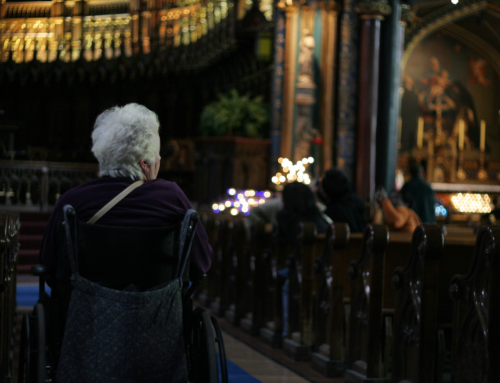If you haven’t yet, read Part 1, where Keith sets the theological stage, before continuing with the conclusion below.
I’m going to take my reflection in a more personal direction. In the final 16 years of her life, my mother Yvonne suffered the effects of two brain tumors – one of which was kept largely under control and the second of which took her life. The impact of even the first one on her cognitive functioning was significant. In some ways, it was difficult to “recognize” her as the mother we had known growing up. But to the end, when we worshipped together she would begin to sway and sing or vocalize to the music. Her embodied presence and the comfort I found in her large blue eyes expressed the peace of God and the love of God in a way that I have never experienced through a sermon. I had a unique relationship with her. Yet, if you asked anyone else in her church community about how God worked through her I’m sure you would hear stories about how she radiated the peace, love, and grace of God to all those around her – to anyone who was willing to pay attention.
I have had the privilege being a part of Christian Horizons Family Camps for many years. These are supported vacations for families who experience a wide range of disabilities. Many attendees have intellectual and developmental disabilities. Whether through the talent show where participants share their God-given gifts or in the daily practices of worship together, we could never be accused of being too “polished” or “performative!” The crafts we make together are unlikely to appear for sale in an art show, nor will we be recording a worship album any time soon. Sometimes it can be difficult to tell where the song began or where it’s headed next. Sermons in this context probably sound more like stories to university-educated folks – parables, even.

Let me tell you, though, friends – I have never experienced God’s presence quite like I have in the midst of Family Camp or in swaying and singing alongside my mom in the final years of her life. While I may never meet Chris Tomlin or Tim Keller (replace with your favourite Christian celebrity) in real life, these kinds of life-transforming relationships are all around us. Praise flows forth from so many people who are not recognized within the narrow confines of our strategically elegant worship practices. We literally “raise up” people whom we decide have something worthy to say. We dim the lights in the back and shine spotlights on those who preach clearly or sing beautifully. We mute those through whom God is expressing the grace and glory of his creation in order to amplify the voices of those who can best capture the clicks, the views, and the “likes” of our disenchanted society.
For many of my friends with intellectual and developmental disabilities, “Their praise is not something that at their most complimentary they say, but something that at their truest they are” (Frederick Beuchner). It is a long and slow process for me, a well-educated and nondisabled white male, to appreciate and to pay attention to the ways that God is working on the margins. I am too easily enchanted by what I consider excellence, duped by compelling delivery. Whether it means pausing my frantic productivity to gaze at crisp pin-points of light in the night sky or turning my attention to a neighbour who does not use words to communicate, I pray that I am “Learning how to say ‘Hallelujah’ from the ones who say it right.”
Imagine, if we listened closely to this Hallelujah chorus, how a worship revolution might transform our spaces of corporate worship, our experiences of belonging and love. Imagine if we opened the floodgates to hearing the voice of God from everybody created in his image. Imagine if, instead of being gatekeepers of glory, we even stopped to pay attention to the ways God is working through our own everyday lives and experiences. If everyone’s praise counts, our church communities are already richer in worship than we could ever imagine.
To read more from Keith about the relationships that shaped him and his thoughts on caregiving, read Formed Together: Mystery, Narrative, and Virtue in Christian Caregiving. (Read a review here.)


